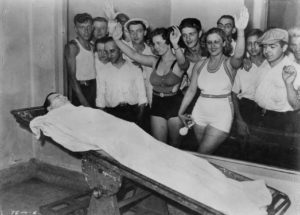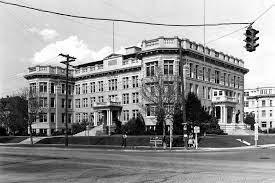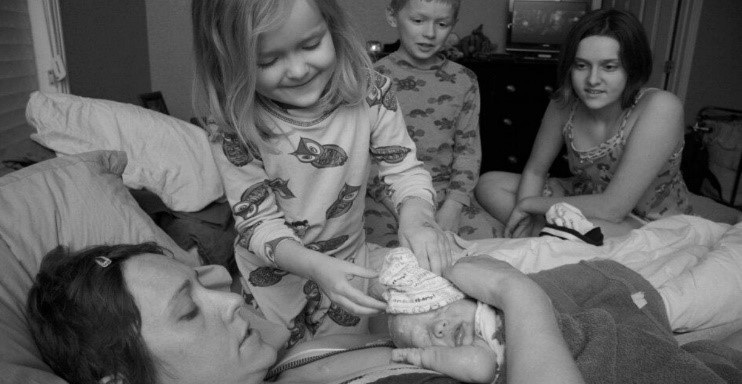
“Karl worked harder than any man should during those grinding years. He came to look like skin and bones, but he was the most courageous and determined man I ever met. Day after backbreaking day he worked more than twenty hours a day, seven days a week. The pre-internship paid a whopping twenty dollars a week. We spent the bulk of our money on Carl’s books and lab fees and Carroll Lee’s food and clothes. She was so cute, we couldn’t let her look like a ragamuffin. Karl and I shared what money was left for our food and rarely had two meals a day. I cannot even now fathom how the man lived on so little.
“But he was the most driven man in the world. He would succeed to become a doctor or die. As if his medical student duties and requirements to study were not enough, Karl got a job as a night lab man at the hospital and did all the afterhours autopsies. He used to tell me great stories about the bums and gangsters, and their molls who came into the morgue all slashed or shot up. His most interesting case and autopsy was done on John Dillinger in 1934, who was betrayed by the mysterious and infamous woman in red. Karl rode the ambulance to pick up his body, and quietly did the morgue work.
“The cops and the hospital kept the death and the autopsy on the QT for about a week, but the newsies got wind of it, and they almost stormed the morgue to get grisly shots. Karl had to lay low and to keep his mug out of the newspapers for fear that the city would get wind of the cushy jobs the pathologists had—and presumably gave a kick-back to the higher-ups. It couldn’t be known that a mere medical student could do such a specialized job; that would tarnish Rush’s reputation.
“Since Karl was not a certified M.D. The lazy staff men got the credit for his work and just came in the morning to sign Karl’s autopsy reports. The staff wanted him to stay on because his work was so good, but Karl wanted out of the city; he had determined that he was going to be country doctor where he could do some good and be loved by the people. I think he accomplished that.
“I hardly saw him for a month while he was on the obstetrics service. He took care of the wretchedly poor girls on the southside—“the baddest part of town”. Criminals abounded and threatened and injured anyone they caught, except the doctors who delivered their babies. Karl usually had to clean up a table with soap and water, spread it with fresh newspaper (which passed for sterility), and to help the frightened inexperienced girls through the ordeal of birth—made all the worse because of their near complete ignorance. Their mothers thought it nasty to talk about such things, and their husbands and fathers, when they were around, either fainted at the sight of blood or were fumble-fingered pinheads.
The gangsters and their molls loved Karl and the Rush Medical School assistants and nurses. Karl was so smart and so good at what he did that they made him the supervisor of the obstetrics outreach program. I could come and spend a little time talking to him between his arrangements for the other medical students to go out and take care of a poor mother in her home. He was working nights, and that was when he could get his studying done.
“We had one special experience during those two hard Depression years. My father and mother visited us and took us to the Chicago World’s Fair. I had never seen or even heard of anything so grand or exciting. In 1933 and 1934 the Chicago’s World’s Fair, known as “A Century of Progress”.
“I got a job at Marshall Field’s Department store on the west side which was a long ways from our little apartment. It was my job to portion out trading stamps in a little booth. It was actually hard work getting all those stamps in the books for all those people for long hours every day. Sometimes I wouldn’t get off work until ten at night, and Ma Poiletti would worry about me. Then, she would send her son Joey to find me and walk me home. I loved them.
“I was only a little afraid of negroes, not for any very good reason really. I remember one really embarrassing night when I was walking home very late. It was pitch black. I walked right into a negro man and did not recognize that I had bumped into a person until I could see the whites of his eyes. He was very nice about it, said “Beg your pardon, ma’am,” very politely. I felt humiliated because I had not been watching well enough.
“I tried to run a boarding house on Maxwell Street, but it was unsuccessful because nobody had any money. We did not have enough to eat. People all around us had nothing to eat, and they looked starved. It wasn’t just that they were poor and couldn’t buy food. There just wasn’t any. The stores shut down because they couldn’t sell produce at a price that would allow them to keep their doors open. The farmers couldn’t sell their produce for a price that it cost to grow crops or animals. So, they used to shovel the produce and starved dead animals into pits and covered them with lime rather than to give the food away. It was an altogether lose/lose situation during the dirty thirties. Somehow, Karl was superhuman and could live on air and some leftover food he got off patients’ trays in the hospitals. The Poilettis sometimes gave us left over scraps from their table when we looked very hungry. She made very good spaghetti, I remember.
“I wasn’t strong enough, and I began to get sicker. I went to a doctor who told me flat out that I was starving, and either Karl and I would have to quit medical school; or I would die; or I would have to go live somewhere I could get enough food. We could not find any way to come up with money, and it was not possible to cut back any more than we did. We obeyed all of the rules of the dirty thirties: “make do, or do without; a penny saved is a penny earned; save it, fix it, fix it up and use it again.”
“When I made my trips on the “L” to see my doctor–which cost a nickel–Karl would run along underneath the elevated railway to go with me because we did not have a second nickel. My father occasionally sent us a little money. We couldn’t borrow any money from anywhere. Nobody–not even the banks–had money to lend. One good thing at the end was that we had spent so little money that he hadn’t accumulated much debt. Finally, after all our struggles, we came to the point where we could not go on.
“The end came one day when I was walking home from work. I don’t remember too well what happened; but apparently, I fainted on the sidewalk and lay there unconscious. A big black man (it was only proper to call them negroes in those days) knew where I lived; so, he picked me up and carried me home including the five flights of stairs in our walkup. There Mrs. Poiletti nursed me back to where I could rejoin the living; but Karl and I had to swallow our pride and call my father, who drove out to Chicago to pick me up and to take Carroll Lee and me back to Spanish Fork where I could regain my health.
“Karl could finish his one last year of medical school. Just. Karl hated the separation; he never wanted for me to be away from him; so, that last year was an even greater burden for him. We could not communicate much; long distance telephone calls cost too much; he didn’t have a phone or good access to one, anyway. We wrote letters; rather, I did. He was so busy trying to do his studies and to earn a little on the side that it was too much of a stretch for him to write to Spanish Fork with any regularity.
“I returned back to Chicago to live with Karl again in the late spring of 1935 during Karl’s last months as a medical student but had to leave Carroll Lee behind in Spanish Fork. At long last, he graduated with an M.D. degree. He weighed his options and decided that he wanted to do what his father did—be a small town doctor and to take care of the town’s people from cradle to grave. We moved to Utah, but we still did not have enough money to live in Salt Lake City. Carroll Lee and I returned to live in Spanish Fork with my parents while Karl did his eighteen-month internship in the Salt Lake County Hospital. He was paid $20 a month.

“That princely sum barely kept him in clothes and with a meager diet. I stayed home much of the time and took care of Carroll Lee, but I did have a part time job at the county auditor’s office computing taxes. Karl came home to Spanish Fork quite a few weekends during his internship, but I think he missed being at the County Hospital. He loved being a doctor. He finally got his dream job; he became a country doctor in a little town in the back side of the tall Rocky Mountains in rural Utah. He lived out his life’s dreams there is all I will say about it.”
The next series of short stories relate to a poor boy who wants to be a doctor and then wants to be a neurosurgeon, even though he knows precious little about either profession. What he does know is that he will be a doctor, no matter what the cost or effort.


